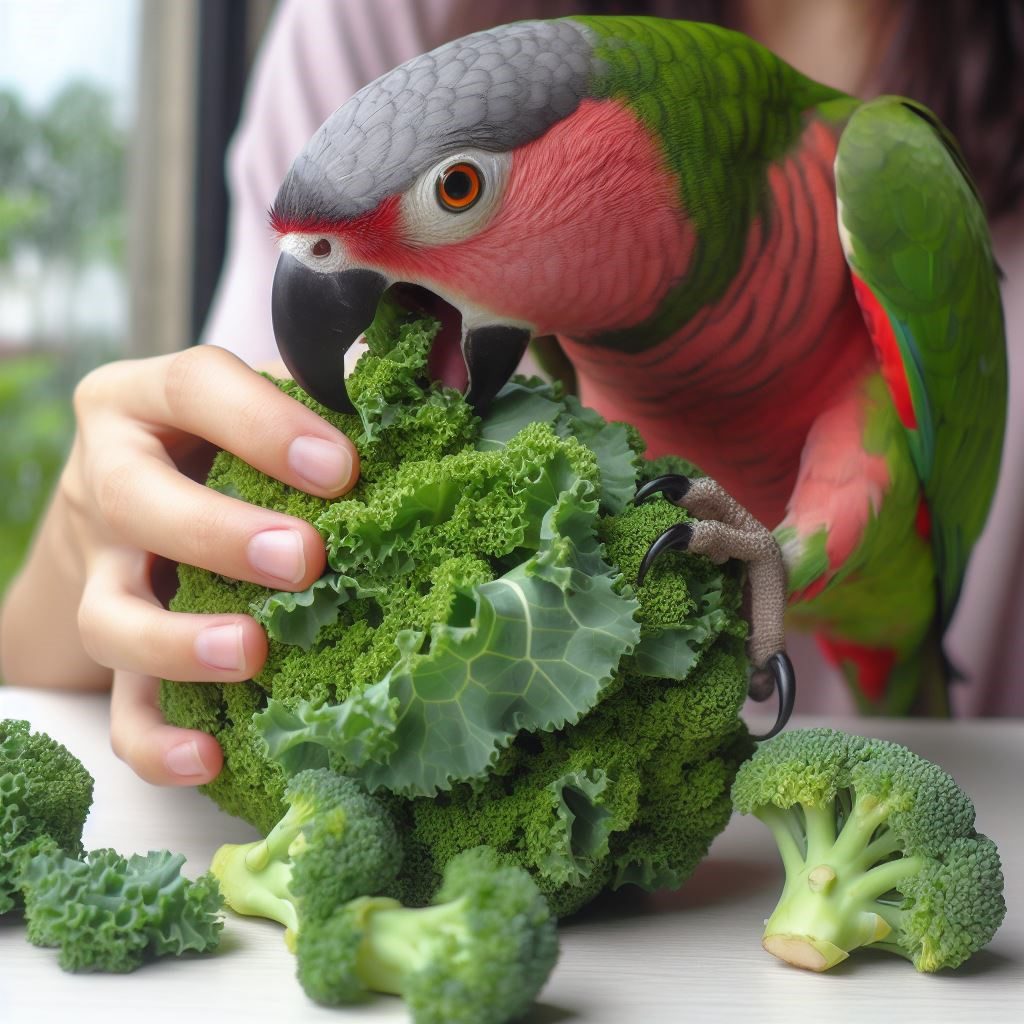We know as humans that we should probably be eating more leafy green vegetables than we’d like to admit. It doesn’t help that they aren’t as tasty compared to pizza or some chicken wings covered in hot sauce but the health advantages of greens are well-studied and apparent. Kale is an example of one of these foods. It’s known as a super-food and it’s not hard to see why as it’s one of the most nutrient-dense foods on the planet, however, does this mean it’s safe for our parrots to eat? Let’s find out.

Can parrots eat kale? Yes, parrots can eat kale and it’s extremely recommended that you add some into their diet. It’s extremely dense in nutrients and a cheap option too. It’s loaded with things like antioxidants, fiber, potassium, vitamins A, B6, C, K, and many other health benefits that we are going to explain further below. Not only is kale safe for your parrot to consume, but it’s encouraged you feed it to them as a parrot parent.
What makes kale so good? Let’s find out the benefits and other things you need to know about feeding kale to your bird.
Kale Benefits For Parrots
We know kale is good for our Parrots, but just how good is it? Let’s take a closer look at the nutritional content.
1 cup of kale provides :
| Calories | 42 |
| Protein | 3.5g |
| Carbs | 4.9g |
| Sugar | 1.4g |
| Fiber | 4.7g |
Fiber
Kale is very high in fiber, a type of carbohydrate that the body can’t digest, it also comes with a range of benefits for the digestive system that include :
- Better bowel movements
- Helps maintain healthy bowel health
- Lowers cholesterol levels
- Helps regulate blood sugar levels
- Helps with maintaining a healthy weight due to foods with fiber being more filling
Strawberries, apples, bananas, carrots, broccoli, and Brussels sprouts are all other great foods high in fiber that you can feed to your parrot.
Antioxidants
Antioxidants are plentiful inside kale. They are substances that are used to neutralize atoms in the body called free radicals. These atoms cause harm to the cells in the body which can lead to faster aging and harmful diseases like cancer.
The primary antioxidants found in kale are the flavonoids quercetin and kaempferol. Both of these substances have been studied and have many great health benefits like heart protection, anti-inflammatory, anti-viral, and anti-cancer effects.
Potassium
Potassium is a mineral that helps your parrot with muscle contractions, sends nerve signals, and regulates fluid. It also has many underestimated effects like :
- Reducing blood pressure
- Remove sodium from the body
- Help maintain a regular heartbeat
Other foods high in potassium that you can feed your parrot include bananas, beans, lentils, and dried fruits.
Vitamin A
Vitamin A is also found in kale, a vitamin important for eye health, the reproductive system, growth, vision, and a healthy immune system.
Vitamin A also has antioxidant properties for fighting against diseases like cancer and heart disease.
Unfortunately, deficiency in vitamin A is common among birds but also easily preventable. It’s more commonly found in birds on an all-seed diet as they lack quality vitamins and nutrients.
Symptoms of vitamin A deficiency include :
- Nasal discharge
- Feather plucking
- Eye discharge or swelling
- Very thirsty
- Not wanting to eat
To prevent a vitamin A deficiency feed your parrot foods dark green leafy vegetables like spinach, broccoli, brussels sprouts, or red/orange fruits like carrots, peppers, mango, and cantaloupe.
Vitamin K
Vitamin K is important for blood clotting, to prevent excess bleeding. If your parrot unfortunately gets a cut and is not getting enough vitamin K in their diet then the cut will bleed more than it should.
Vitamin C
Vitamin C; also known as ascorbic acid, is a vital nutrient for growth, development, and repair of body tissues and is involved in many bodily functions. It also has many benefits like :
- Protecting your parrot’s immune system
- Lowering blood pressure
- Regulating blood pressure
- Acting as an anti-inflammatory
- Works as an antioxidant to neutralize free radicals – preventing cancer and other diseases
Foods you can feed to your parrot that also contain vitamin C include red and green peppers, pineapple, kiwi, mango, and cauliflower.
Vitamin B6
Vitamin B6 is one of eight B vitamins and it’s also found in kale. This group of vitamins is responsible for helping with metabolism, making red blood cells, and keeping cells healthy in general.
Vitamin B6 is also a mood enhancer as it’s responsible for creating feel-good neurotransmitters like dopamine and serotonin.
Manganese
Manganese is a trace mineral that helps the body absorb calcium better, regulation of blood sugar, carbohydrate and fat metabolism, and blood clotting, and is important for normal brain and nerve function.
How You Should Feed Kale To Your Parrot
I like to cut up my parrot’s kale and add it to his chop with other things like spinach, carrots, and broccoli. What this does is provide him with the benefits that these other fantastic foods have, but also eliminate any choking risk that might happen if his kale isn’t cut up – I like to stay on the safe side.
What Other Foods Can Your Parrot Eat?
You know kale is safe for your Parrot to eat but if you’re like me then you’re always looking for new foods to improve your Parrot diet to create some variety and include vital things that aren’t already in your bird’s diet.
So what other foods can your Parrot eat?
- Fruit & Vegetables
Foods like asparagus, broccoli, carrots, peppers, bananas, blueberries, and pineapples are all fine and encouraged for your Parrot to eat.
- Nuts
Things like almonds, Brazil nuts, cashews, hazelnuts, pistachios, and walnuts can be fed to your parrot. Just be wary of the fat content in some of them so they may need to be treated as a snack for your Parrot. We don’t want them getting fat!
Frequently Asked Questions
Should I Feed Kale Cooked Or Uncooked?
Both options are going to be safe for your parrot however I like to go with uncooked kale as the cooking process burns away some of the quality nutrients in kale that I want to give to my parrot in the first place.
However, if you want to cook your kale then it’s not a problem as long as no other harmful ingredients are being cooked in with it.
Kale For Parrots – Final Thoughts
You probably know why kale is a super-food now after reading about the endless benefits it has for our parrots. You should definitely consider adding it to your parrot’s diet but even though it’s a great food as it’s a vegetable it shouldn’t be treated as a staple in your bird’s diet. Fruits and vegetables should only make up around 15-20% of your parrot’s daily nutrition.






